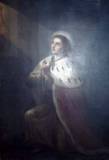PLEASE PRAY FOR THE FOLLOWING INTENTIONS
WHAT’S HAPPENING
| ||||||||||||||||||||||||||
|
ST. ATHANASIUS Bishop,
Doctor May 2nd
|
|
|
Jesus “utterly destroyed the power death had against mankind—as fire consumes chaff—by means of the body he had taken and the grace of the resurrection. This is the reason why the Word assumed a body that could die, so that this body, sharing in the Word who is above all, might satisfy death’s requirement in place of all.” (from a sermon Athanasius gave on the Incarnation of the Word.) Athanasius is an example of the great bishops of the fourth and fifth centuries. They were learned, pastoral and responsive to the needs and challenges of the times. They were bishops, who after the Scriptures, were transmitters of divine revelation. Athanasius was born in Alexandria, Egypt. He was educated, ordained a deacon, and three years after the Council of Nicea (325 A.D.) he was named Bishop of Alexandria. Two important things happened at the Council of Nicea: 1) the ideas of Arius (a priest who preached against the divinity of Christ) were condemned, and 2) the bishops composed the Nicene Creed, a profession of faith in defense of Christ’s divinity. Athanasius was a strong defender of Christ’s divinity, and the Arians fought him throughout his career. Five times he endured exile from his Episcopal see, for a total of seventeen years. After his fifth exile St. Athanasius was called back to his see when the people threatened a revolt. By then he had been vindicated, and the emperor (fearing the people) recalled him. His last eleven years were spent in peace. We appreciate St. Athanasius not only for his teaching against heresy. He also wrote the biography of St. Anthony the hermit, in which we learn of the beginnings of the monastic movement; his letters are important historical and often doctrinal documents. He is one of the great figures of Christianity. Sources: IN HIS LIKENESS by Rev. Charles E. Yost, SCJ, STL and SAINTS AND FEAST DAYS SUPPLEMENT, Loyola University Press |
|
|
|
THOUGHTS FROM THE CATECHISM OF THE CATHOLIC CHURCH |
Mary and the Church
#487 What the Catholic faith believes about Mary is based on what it believes about Christ, and what it teaches about Mary illumines in turn its faith in Christ.
#965 After her Son’s Ascension, Mary “aided the beginnings of the Church by her prayers.” In her association with the apostles and several women, “we also see Mary by her prayers imploring the gift of the Spirit, who had already overshadowed her in the Annunciation.”
|
|
REFLECTION |
|

A MOTHER WITH AN OPEN HEART
A Church which “goes forth” is a Church whose doors are open. Going out to others in order to reach the fringes of humanity does not mean rushing out aimlessly into the world. Often it is better simply to slow down, to put aside our eagerness in order to see and listen to others, to stop rushing from one thing to another and to remain with someone who has faltered along the way. At times we have to be like the father of the prodigal son, who always keeps his door open so that when the son returns, he can readily pass through it.
The Church is called to be the house of the Father, with doors always wide open. One concrete sign of such openness is that our church doors should always be open, so that if someone, moved by the Spirit, comes there looking for God, he or she will not find a closed door. There are other doors that should not be closed either. Everyone can share in some way in the life of the Church; everyone can be part of the community, nor should the doors of the sacraments be closed for simply any reason. This is especially true of the sacrament which is itself “the door”: baptism. The Eucharist, although it is the fullness of sacramental life, is not a prize for the perfect but a powerful medicine and nourishment for the weak. These convictions have pastoral consequences that we are called to consider with prudence and boldness. Frequently, we act as arbiters of grace rather than its facilitators. But the Church is not a tollhouse; it is the house of the Father, where there is a place for everyone, with all their problems.
Source: The Joy of the Gospel, EVANGELII GAUDIUM, numbers 46-47, Pope Francis


 AT ST. CASIMIR PARISH?
AT ST. CASIMIR PARISH?
